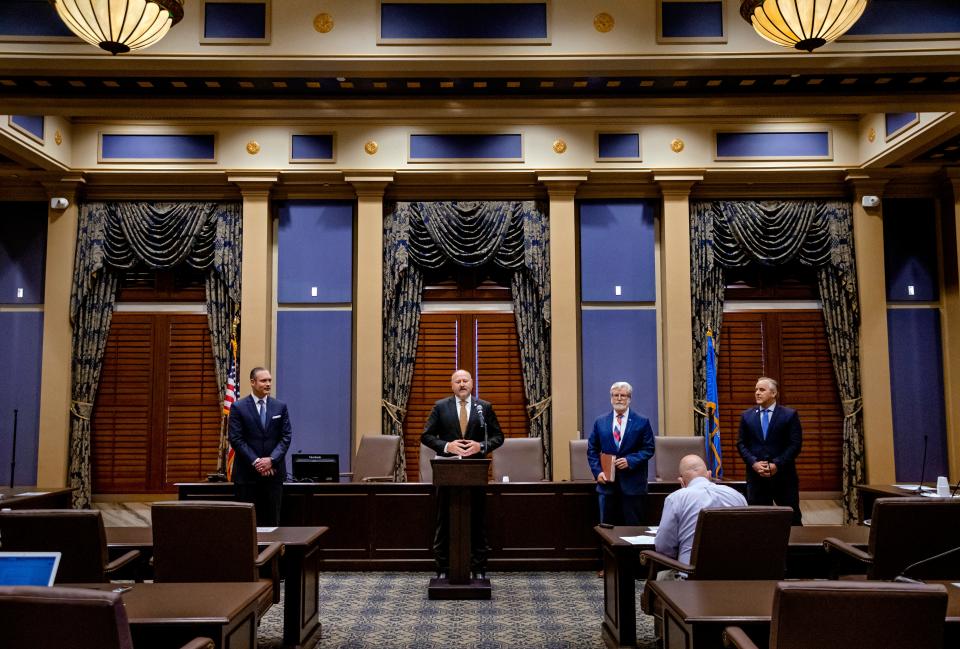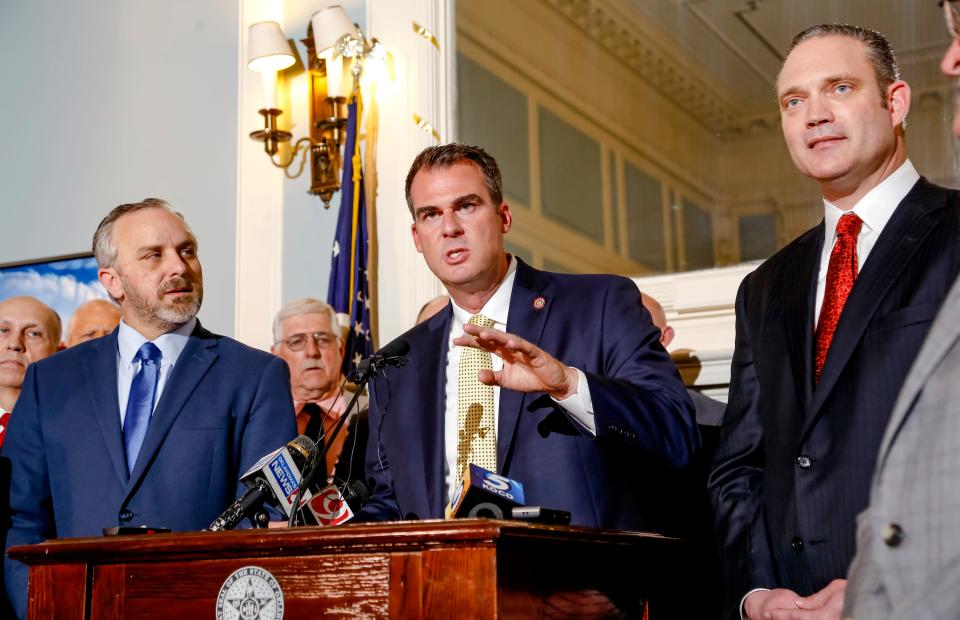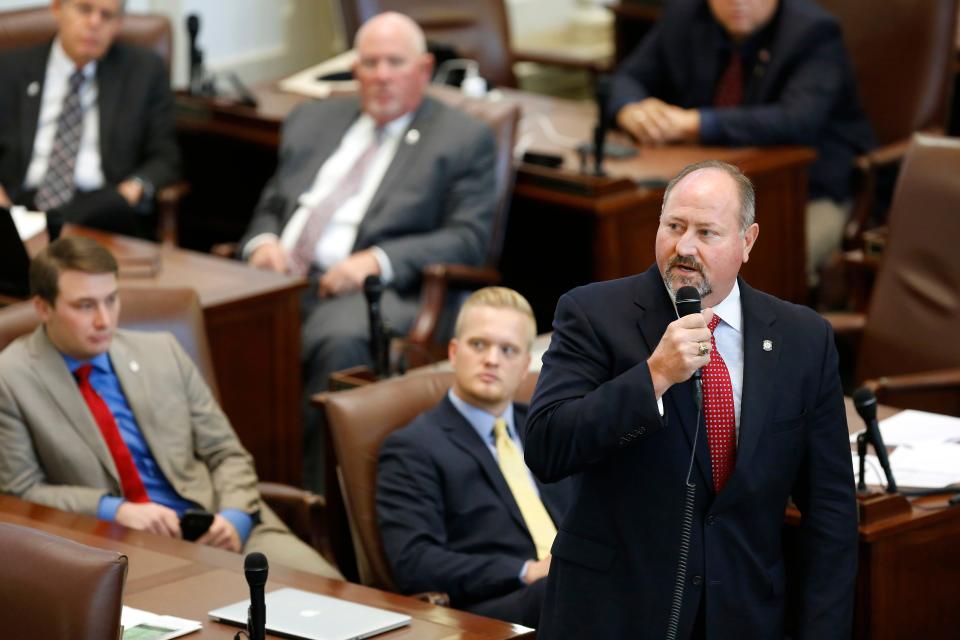Oklahoma budget process can be mysterious, even for many lawmakers
Oklahoma’s multi-billion dollar budget is the landmark legislative action each spring that sets the course for how much money state agencies have to spend, impacting everything from the resources available in classrooms to the number of state troopers patrolling the highway.
But the process it takes to complete is largely conducted in secret, negotiated among a few lawmakers and high-ranking government officials before the rest of the Legislature has a few days to approve.
“It’s really going to come down to six people,” said Labor Commissioner Leslie Osborn, a Republican who was the chair of the House Appropriations and Budget Committee from 2016 to 2017.
Those six people are the governor and his lead budget negotiator, the House Speaker and his budget committee chair, along with the Senate pro tem and his budget committee chair.
“The Senate always holds a few things close to the vest, so does the governor’s office, and a few of those things don’t come out until the last part of the (legislative) session,” Osborn said.
“It’s a bit of poker playing.”
Behind closed doors
The Oklahoman interviewed more than 35 current and former lawmakers, legislative and gubernatorial staff members, along with budget policy experts, in an effort to better understand the state budget process.
It's a process that has grown more secretive in recent years, where most lawmakers, including those in the majority party, are largely out of the loop on what the budget will look like until a final proposal is announced.
Senior lawmakers meet privately throughout the legislative session and a final budget proposal is typically unveiled with just days to spare, drawing complaints from some that the budget process lacks transparency.
But Sen. Roger Thompson, the chair of the Senate’s budget committee, said the whole process begins out in the open.
“People talk about it not being an open process but there’s an open process going on right now,” Thompson, R-Okemah, told The Oklahoman last month, referring to the budget hearings already being held before the Senate and House, allowing state agencies to publicly make funding requests and allowing lawmakers to ask questions.
“I've been here eight years and I've still not found the smoke-filled room where the budget deals got done.”
More: Oklahoma leaders on state budget: 'This is not the year to really spend'

State budget called the 'least transparent thing' lawmakers do
Open budget hearings have already been conducted in front of budget subcommittees and the governor will unveil his own budget proposal this week.
House and Senate leaders will then begin hashing out their own budget plan, especially after the state’s Board of Equalization meets later this month to officially set the amount of money in play, projected to be around $10.3 billion.
Democrats, who mostly represent the state’s two largest cities but are a minority in the Legislature, are left in the dark.
“As a (Democratic) caucus we generally come up with our own budget and we send those requests to the Speaker, and that's pretty much it, we aren’t very involved,” said Rep. Emily Virgin, D-Norman, leader of the House Democrats.
“That’s not just the experience of the minority party, that's the experience of the vast majority of the Republicans. The budget is generally the least transparent thing we do,” Virgin said.
As a freshman lawmaker in 2006, former Rep. Earl Sears, a Republican, would get frustrated about the lack of information he had about the budget process.
“I would go to a caucus meeting and ask, ‘What are we doing on this aspect of the budget?’ and they would say 'I can’t tell you because we are still negotiating,'” Sears said. “I would come home to my district and people would ask what is going on with the budget and I couldn’t tell them.”
When Sears became House Appropriations and Budget Chairman in 2010, he remembered his frustration and decided to have an “open-door policy” with other members, at least as much as he could.
“Every Thursday from 7:30 to 9 p.m. I would get a room and I would let members come in and let them ask about the budget negotiations,” Sears said.
Sears said he wanted transparency but acknowledged not every aspect of the budget process can be revealed.
“It’s always a negotiation with the Senate, and the governor has his or her opinion, and I know you don’t want to negotiate out on the 6 o'clock news, so there has to be some discussion behind closed doors in confidence,” Sears said.
The current House budget chair, Rep. Kevin Wallace, said his approach to keeping lawmakers in the loop is to always be straight with them about what’s possible and what’s not.
“I try to be an open book and tell everybody what's going on, (that this is) how much money we have,” said Wallace, R-Wellston.
“I can tell you right now, there is never enough money to fund all the requests.”
More: Oklahoma lawmakers seek $308 million for tribal justice, say McGirt 'bankrupting' tribes

Lobbyists targeted key budget negotiators
During his tenure as former Gov. Mary Fallin’s secretary of finance, Preston Doerflinger would hold weekly budget meetings with key legislative leaders during the Tuesday lunch hour. The goal wasn’t to share a meal, but rather to stay up to date on negotiations and hear from state budget analysts on what various proposals would look like.
But lobbyists quickly found out about the gatherings and free meals began to arrive at the meeting.
State staff stuck to their sack lunches, not wanting to compromise their positions of objectivity.
But the target for lobbyists was the lawmakers leading the budget negotiations.
Whether a free plate of fajitas is enough to sway major budget decisions is unknown. But what is clear is that those responsible for budget decisions get a bulk of the lobbying attention.
Last year, three of the state Legislature’s top four recipients of lobbyist gifts and meals were the House and Senate budget chairmen, along with the Senate budget committee's vice-chairman, according to state lobbying expense reports.
The lobbying comes from outside companies possibly looking to benefit from government spending and also from state agencies hoping for a funding increase, or at least to avoid a cut.
Sears, the former House budget chairman, said the biggest state agencies, such as common education, transportation and health, often had their agency directors lobby directly to budget chairs.
“But you would still see lobbyists advocating for parts of the budget,” Sears said. “There was once a group that wanted the contract to make new car tags and they would send in their lobbyists to advocate for the car tag change. But I can’t tell you they were any more effective at advocating their case.”
Lobbyists, agency leaders and other advocates focus on those behind-the-scenes meetings because when a final budget proposal is announced there is often very little time to make changes.
The Oklahoma Policy Institute, a Tulsa-based think tank, recently published a report showing the average state publicly debates its proposed budget for 82 days. In Oklahoma, the average is three days.
“The budget is introduced late in the session and it’s introduced and passed within a few days. That is not normal,” said Emma Morris, a revenue policy analyst for the Oklahoma Policy Institute, speaking at its annual budget seminar last month.
More: Oklahoma leaders will have more than $10B for state budget, a first in state history

Oklahoma's budget process is demanding, takes years to learn
Sitting in his second-floor office inside the state Capitol, which includes a seating area and wall-mounted television, luxuries indicative of the power he holds as the House budget chair, Wallace explained his approach to budget negotiations while keeping one eye on the television news, where the latest headlines can quickly sway the state’s budget outlook.
Disruptions in oil supply, unemployment rates, even weather can have an impact on the amount of tax revenue that flows into the state.
The chances for such big swings in revenue, especially for a state so dependent on the energy sector, has Wallace taking an extremely conservative view toward how much money the state should be spending each year.
"I hope that going forward that we will never ever appropriate our full authority by a large percentage, like having a three or four or five percent additional cushion," Wallace said.
That approach is not embraced by all lawmakers, especially in a year when the state has more money to spend than last year.
Democrats traditionally advocate for increased spending on core services, including education, while many Republicans push for tax cuts, which lowers the state's revenue.
Wallace said sometimes the job of the budget chair is to explain the process to other lawmakers, especially with term limits ensuring a relatively large new group of senators and representatives each cycle.
Like most issues in the Legislature, the 12-year term limit has diminished institutional knowledge, especially when it comes to understanding the budget process, Osborn said.
“A lot of the things we do at the Capitol take years to understand,” Osborn said. “My assumption for the average member is it's going to take eight to 10 years to understand our complex budget process.”
Passing a balanced budget is technically the only task the Legislature is required to do each session and it’s not uncommon for lawmakers to predict an early exit.
“Every year we hear this is the year we are going to get out early, we are going to leave a month early and save the taxpayers money,” Osborn said. “But it’s really not until those last 30 days when (budget discussions) become really serious.”
This story is provided in part through a grant by the Kirkpatrick Foundation. To support work like this, please consider purchasing a digital subscription today at https://cm.oklahoman.com/specialoffer/.
This article originally appeared on Oklahoman: Oklahoma's budget process draws complaints over transparency

